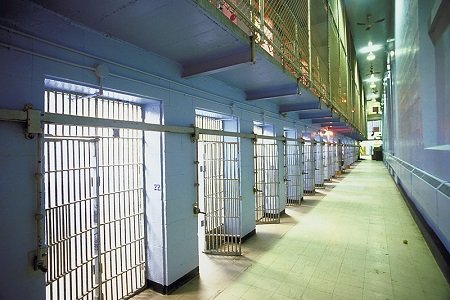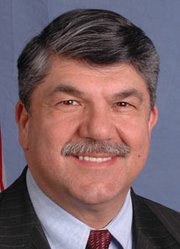Sgt. Lisa Henson is a prison guard in Baltimore. It’s a job she has had for 20 years. She is a straightforward and blunt woman. “I have a simple mantra about the work I do: I am fair, firm and impartial,” she said.
Richard Trumka is the president of the AFL-CIO
Like Sgt. Henson, I believe in the rule of law. I believe that people who make serious mistakes should pay appropriate penalties. Like her, I also think all of us are entitled to fair treatment from our criminal justice system. I believe, too, in the power of redemption and the need for us to support people who have done their time and want to rejoin society.
Sgt. Henson and I recently talked about the challenges in America’s criminal justice system, one of which is the need to improve wages in the communities where inmates are coming from.
The research I’ve seen supports what Henson says: “People want a way up and a way out. People will provide for their family members if they can. If they can’t, our communities fall apart. That’s how we get young people growing up in broken homes or raising themselves and getting into trouble. It’s a cycle that we need to break.”
Frankly, it seems America has approached criminal justice backwards. Under the guise of public safety, we have spent too much time and far too much money forcing millions of people of color into a permanent criminal class. We have selectively locked people up, sealed people out and shut entire communities down. The irony is doing so has made our country less safe.
People of color are suspected more, arrested more, charged more, convicted more and imprisoned longer, and those ugly facts have helped America earn the terrible title of most-imprisoned nation among developed countries. We sentence people to prison at between five and 10 times the rate of any other advanced nation. The more you look at the numbers, the worse it gets.
Today, one-third of black men in America will serve time in state or federal prison at some point in their lifetime. That is twice the rate from the 1970s and over five times higher than white men, even though studies show black men and white men commit crimes at roughly the same rates.
Let me make this point emphatically: this is not a result of higher crime rates. This is because of lengthy mandatory minimums for drug offenses and “three-strikes” laws that put people away for life and get this: Mass incarceration has not even reduced crime.
Yet it has been hell on families, especially children. Almost seven times as many kids had dads in prison in 2000 as in 1980. As you can imagine, a prison-at-all-costs mentality runs up quite a price tag. Can you believe $80 billion a year? It’s true, and the number is four times higher when you count police, judicial and legal services.
However thanks to courageous activists in California, our nation is beginning to wake up to the reality of this terrible miscarriage of justice. Last fall, California voters passed Proposition 47. The measure reduces most nonviolent crimes— including petty theft and minor drug possession— from felonies to misdemeanors. The sentences of nearly 10,000 prisoners could be reduced. The savings to California are projected to reach at least $150 million, and will go into a Create Safe Neighborhoods and Schools Fund. This new law offers a true opportunity for a better life for Californians, and a model for progress for America.
I’m proud to join Sgt. Henson in a call to replace mass incarceration with mass employment and fair wages. This is a call for justice, for families and for public safety. I hope you’ll join us, too.
Richard Trumka is the president of the AFL-CIO, the nation’s largest organization of labor unions. He grew up in the coal country of southwest Pennsylvania.

